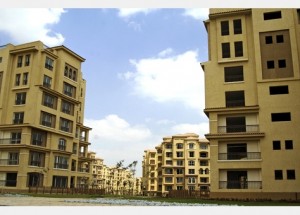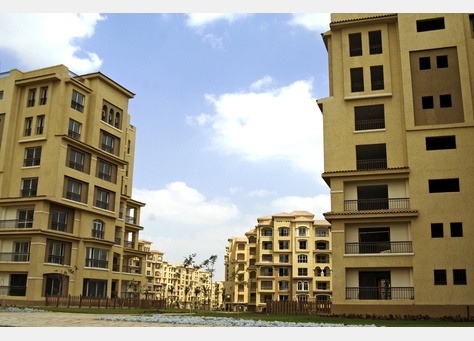
(AFP File Photo)
By Abdel Qader Ramadan
The Egyptian Center for Economic Studies (ECES) has proposed a programme for merging the informal real estate and economic activities in Egypt with the formal economy, according to a news release.
Its goal is to encourage and motivate Egyptians involved in informal economic activity or with unrecorded assets to join the formal economy in order to benefit from the advantages and opportunities of the open market.
ECES hopes this integration will create new wealth capable of raising the standard of living for a large number of Egyptians.
The volume of informal real estate and commercial establishments in Egypt is much higher than many expect, according to ECES. These assets include any unregistered property, including buildings on agricultural land, encroachment of state property, public housing units subject to various restrictions on property transfer, illicit units in registered buildings, and adverse possession (squatting), which is un-registerable under the current legislation.
According to the statement, unregistered real estate wealth is estimated at nearly $240bn, representing about 64% of total real estate wealth. As for industrial and commercial activities outside of the formal sector, it is estimated that it employs nearly five million persons, including nearly 2.7 million business owners, or about 82% of all business owners in Egypt, and produces about 40% of GNP.
The programme focuses on two major types of assets, according to the news release. The first is real estate assets, whether buildings, farmland, or other. The second is the various production units from workshops and informal shops which is not registered or licensed.
The programme proposes the establishment of a legislative and administrative system which, on the one hand, encourages people to register, and, on the other hand, discourages them from remaining within the informal framework.
The programme expects to see a strong set of positive results from this integration, including: adding 2% higher annual economic growth, supporting the rule of law and public order, expanding the number of beneficiaries to at least 50 million people, increasing social security revenue to the tune of £3.9bn per year, and increasing income tax receipts by 8% per annum, ECES wrote.
The programme works to integrate nearly five million workers into the formal sector so as to provide them with all the guarantees thereof, such as pensions and social security, and enable informal enterprises to gain access to credit and financing through official channels, in addition to using their assets as collateral to borrow.
ECES projects that integrating the informal sector would create a set of rules for information regarding assets, real estate, and real estate dwellers in order to assist in targeting these groups to improve their living conditions through social security services and cash assistance.
The programme summarises a set of proposals to address the issue. In terms of the real estate sector, it is recommended that registration procedures for proof of ownership documents be simplified and streamlined; the full registration power be entrusted to a local registry; registration fees be reduced; a dispute resolution mechanism be established; real estate and inventory be recorded; and a new administrative apparatus to apply the legal and administrative system be created.
As for the commercial sector, the programme proposes the creation of a new management body for implementing the transfer of business activities from the informal sector into the formal sector by encouraging the owners of these activities to register them. All necessary documents and licences should be made available at one administrative agency and, absent a cause for rejection; applications for licences should be promptly processed and approved.
The purpose of these proposed procedures is to overcome the red tape and bureaucracy that has doubled the cost of handing off property or obtaining licences and permissions to engage in various commercial and industrial activities.
The proposed programme suggests that reducing the fees imposed on registering deeds for land and real estate units may remove a major obstacle on recording these contracts, according to the news release.
This programme focuses on the individual willingly accepting integration in the formal economy, which brings him the greatest benefit and ensures his rights and benefit from various government services. The cost of establishing an entity formally and the cost of registration is less than the cost of continuing in the informal sector, the statement added.
The programme recommends the state adopt a comprehensive strategy to create policies which incentivise individuals to enter and voluntarily remain in the formal sector, but stresses this cannot be achieved without the political will.



